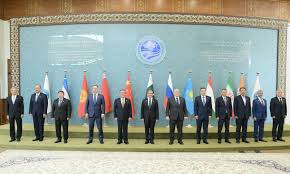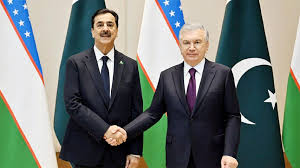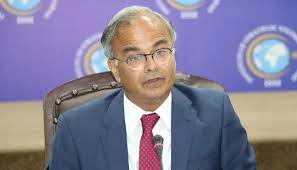Joint communiqué: SCO urges end to protectionism, trade curbs

Islamabad:The member states of the Shanghai Cooperation Organisation (SCO) have come together to “oppose protectionist actions, unilateral sanctions and trade restrictions that undermine the multilateral trading system and impede global sustainable development.”
“The heads of delegation consider it important to continue joint efforts to counter protectionist trade measures that are contrary to WTO (World Trade Organisation) rules and regulations, as well as to continue working on strengthening the rules-based WTO, non-discriminatory, open, equitable, inclusive and transparent multilateral trading system, based on the WTO,” read a joint communique issued Wednesday by top delegates from all 10 member states of the Shanghai Cooperation Organisation (SCO) on the conclusion of the two-day meeting of the SCO’s Council of Heads of Government (CHG).
“The heads of delegations emphasised that the unilateral application of sanctions is incompatible with the principles of international law and has a negative impact on third countries and international economic relations,” the joint communique read.
Economy, trade, environment and socio-cultural linkages: Key decisions to be taken to boost intra-SCO ties
The communique was issued by India’s External Affairs Minister Subrahmanyam Jaishankar, China’s PM Li Qiang, Russia’s PM Mikhail Mishustin, Iran’s Industry, Mine and Trade Minister Seyed Mohammad Atabak, Uzbekistan’s PM Abdulla Aripov, Belarus PM Roman Golovchenko, Kazakhstan’s PM Olzhas Bektenov, Kyrgyzstan Premier Akylbek Zhaparov, Tajikistan PM Kohir Rasulzoda, and Pakistan’s PM Shehbaz Sharif, who chaired the 23rd meeting of the SCO’s CHG.
Pakistan’s Deputy Prime Minister/Foreign Minister Ishaq Dar and SCO Secretary-General Zhang Ming jointly presented the communique.
All the SCO member states’ delegates, barring India, reaffirmed support for China’s One Belt, One Road (OBOR) initiative, noted ongoing work on joint implementation of the project, including efforts to bridge the Eurasian Economic Union and OBOR.
All the delegates advocated respect for the “right of peoples to independently and democratically choose their political, social and economic development.”
The delegates reaffirmed the commitment to the peaceful settlement of differences and disputes between countries through dialogue and consultations.
The delegates, as per the joint handout, advocated the promotion of cooperation within the framework of the SCO Year of Sustainable Development, considering it important to pursue sustainable and inclusive economic growth of member states by optimising the region’s potential in areas such as green development, digital economy, trade, e-commerce, finance and banking, investment, high technology, start-ups and innovation, poverty alleviation, healthcare, including traditional and folk medicine, agriculture, industry, transport, logistics connectivity, energy, including renewable energy, communications, science and technology, environment and climate change.
The heads of delegations reaffirmed their desire to ensure stable economic and social development in the SCO region and noted the importance of implementing the SCO Economic Development Strategy for the period up to 2030 and the Programme of Multilateral Trade and Economic Cooperation of the SCO member states. They stressed the need for coordinated efforts through the mechanisms of relevant cooperation in order to implement the respective action plans.
The delegates believed it was necessary to effectively utilise the digital economy and scientific and technological innovations in order to give a new impetus to economic development and progress in the SCO space, as well as to enhance the competitiveness of the region’s economy and potential.
According to the joint statement, the heads of delegations stressed the importance of deepening cooperation in the field of information security, the relevance of the digital divide issue and advocated for exploring the creation of a mechanism for cross-border data exchange, taking into account the national legislations of countries, the introduction of digital technologies in the economic and social spheres, the development of e-government, electronic payment systems, e-commerce and other areas of digital business.
Including Pakistan, the host, the 23rd CHG meeting was attended by 12 countries; China, India, Iran, Russia, Belarus, Kazakhstan, Kyrgyzstan, Tajikistan, Uzbekistan, Mongolia and Turkmenistan.
Barring Turkmenistan and Mongolia, the remaining states are SCO members.
Previously, the SCO had nine member states; China, Pakistan, India, Iran, Russia, Uzbekistan, Kazakhstan, Kyrgyzstan, and Tajikistan.
In September 2022, the process of raising the status of Belarus to the level of a member state began at the Samarkand SCO Summit. Belarus joined SCO as 10th member at Astana Summit held this July.
The SCO is a permanent intergovernmental international organisation established on 15 June 2001 in Shanghai, China.
As per its charter, the SCO’s goals are: to strengthen mutual trust, friendship and “good-neighbourliness” between the member states; to encourage the effective cooperation between the member states in such spheres as politics, trade, economy, science and technology, culture, education, energy, transport, tourism, environmental protection to jointly ensure and maintain peace, security and stability in the region; and to promote a new democratic, fair and rational international political, and economic international order.
The CHG meets once a year to discuss the strategy of multilateral cooperation within the SCO.





